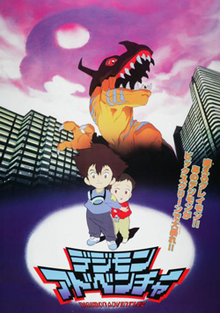Loading AI tools
1999 anime film From Wikipedia, the free encyclopedia
Digimon Adventure (Japanese: デジモンアドベンチャー, Hepburn: Dejimon Adobenchā) is a 1999 Japanese animated short film, directed by Mamoru Hosoda in his directorial debut. A part of the Digimon media franchise, Digimon Adventure is the first Digimon film, and serves as a prologue to the 1999 anime television series of the same name. The film was released in theaters in Japan on March 6, 1999, the day before the release of the Digimon Adventure television series.
| Digimon Adventure | |||||
|---|---|---|---|---|---|
 Poster | |||||
| Japanese name | |||||
| Kanji | デジモンアドベンチャー | ||||
| |||||
| Directed by | Mamoru Hosoda | ||||
| Written by | Reiko Yoshida | ||||
| Based on | Digimon by Akiyoshi Hongo | ||||
| Produced by | Hiromi Seki | ||||
| Cinematography | Shigeru Andô | ||||
| Edited by | Yasuhiro Yoshikawa | ||||
| Music by | Takanori Arisawa | ||||
Production company | |||||
| Distributed by | Toei Company | ||||
Release date |
| ||||
Running time | 20 minutes | ||||
| Country | Japan | ||||
| Language | Japanese | ||||
| Box office | ¥650 million | ||||
In Tokyo, a creature hatches from an egg that emerges from a computer screen in the home of Taichi Yagami / Taichi "Tai" Kamiya and his younger sister Hikari Yagami / Kari Kamiya. Upon being cared for by the children, it transforms into a dinosaur-like creature that begins wandering the streets of the city. A second egg appears in the sky over Tokyo, from which a bird-like creature emerges. Taichi, Hikari, and several other children witness the two creatures fight; with Taichi and Hikari's encouragement, the dinosaur emerges victorious and both creatures vanish.
Ai Nagano, Shizuka Okohira, Shoko Kikuchi, and Yū Sugimoto provide the voices of children.[1]

Digimon Adventure was directed by Mamoru Hosoda, written by Reiko Yoshida, and produced by Toei Animation. It is the first of two Digimon movies directed by Hosoda, preceding Digimon Adventure: Our War Game! (2000).[2] The film was originally conceived as a standalone project based on the Digital Monster virtual pet created by WiZ[3][4] and Bandai, with character designs by Katsuyoshi Nakatsuru that were inspired by 1970s comic book artwork. Following the launch of the manga series Digimon Adventure V-Tamer 01 in the manga magazine V Jump in 1998, Toei elected to make the manga's protagonist Taichi Yagami / Taichi "Tai" Kamiya the primary character of Digimon Adventure; the film was ultimately re-developed into a prologue for the 1999 television series of the same name, which began production a month and a half after the film began production.[5]
As he was unable to place the events of the film in the same time period as the 1990s-set Digimon Adventure television series without creating plot inconsistencies, Hosoda's original concept for the film was a story in which Taichi's father / Tai's father and his Digimon partner travel around Tokyo against the backdrop of the 1964 Summer Olympics;[5] the proposal was rejected, and Hosoda was instead instructed to create a kaiju film.[5] Faced with the difficulty of creating a kaiju film in the film's 20 minute length, Hosoda and Yoshida elected to focus principally on the film's climactic fight scene. Concerns around plot inconsistencies between film and television series were resolved by placing the events of the film several years before the events of the series.[5]
Digimon Adventure was released in theaters in Japan on March 6, 1999,[6] a day before the release of the Digimon Adventure television series.[7] It was released as part of the Spring 1999 Toei Animation Fair, alongside Yu-Gi-Oh! and Doctor Slump: Arale's Surprise Burn.[8] A DVD collecting Digimon Adventure and Digimon Adventure: Our War Game! was released on October 13, 2000, for rental,[9] and on January 21, 2001, for purchase.[10]
The film's theme song is "Butter-Fly" by Koji Wada.[11]
In North America, footage from Digimon Adventure was edited with footage from the films Digimon Adventure: Our War Game! (2000) and Digimon Adventure 02: Digimon Hurricane Touchdown!! / Transcendent Evolution! The Golden Digimentals (2000) to create Digimon: The Movie, which was released in theaters on October 6, 2000.[12]
In July 2023, Discotek Media announced plans to release both Digimon: The Movie and the individual films. The films are being given new dubs featuring surviving members of the original cast, including Joshua Seth, Michael Reisz, and Lara Jill Miller, as well as new cast members, such as Bob Papenbrook's son, Bryce Papenbrook, as Red Greymon.[13]
Digimon Adventure, Yu-Gi-Oh! and Doctor Slump: Arale's Surprise Burn collectively grossed ¥650 million (2001)[14] (equivalent to ¥670.41 million or US$6.15 million in 2019)[15].
Producers of Gamera 3: Revenge of Iris which was released on the same day as Digimon Adventure, largely praised the Digimon film, and later noted in an interview that the film is inspiring and made them to realize that they should seek to create entertainments like Digimon Adventure.[16]
Crunchyroll praised Digimon Adventure as an "endearing short film," praising Hosoda's "admirable" direction and storytelling in spite of the largely commercial purpose of the film.[17] Writing for Polygon, Allegra Frank concurs that while the film is attached to a "Pokémon-like multimedia machine," it has "heart, and humor";[7] Chris Cimi of Otaquest similarly notes that while the film is "made to sell toys and games, Hosoda proved his aptitudes for resonance and charismatic visual story-telling clear as day."[18]
Seamless Wikipedia browsing. On steroids.
Every time you click a link to Wikipedia, Wiktionary or Wikiquote in your browser's search results, it will show the modern Wikiwand interface.
Wikiwand extension is a five stars, simple, with minimum permission required to keep your browsing private, safe and transparent.